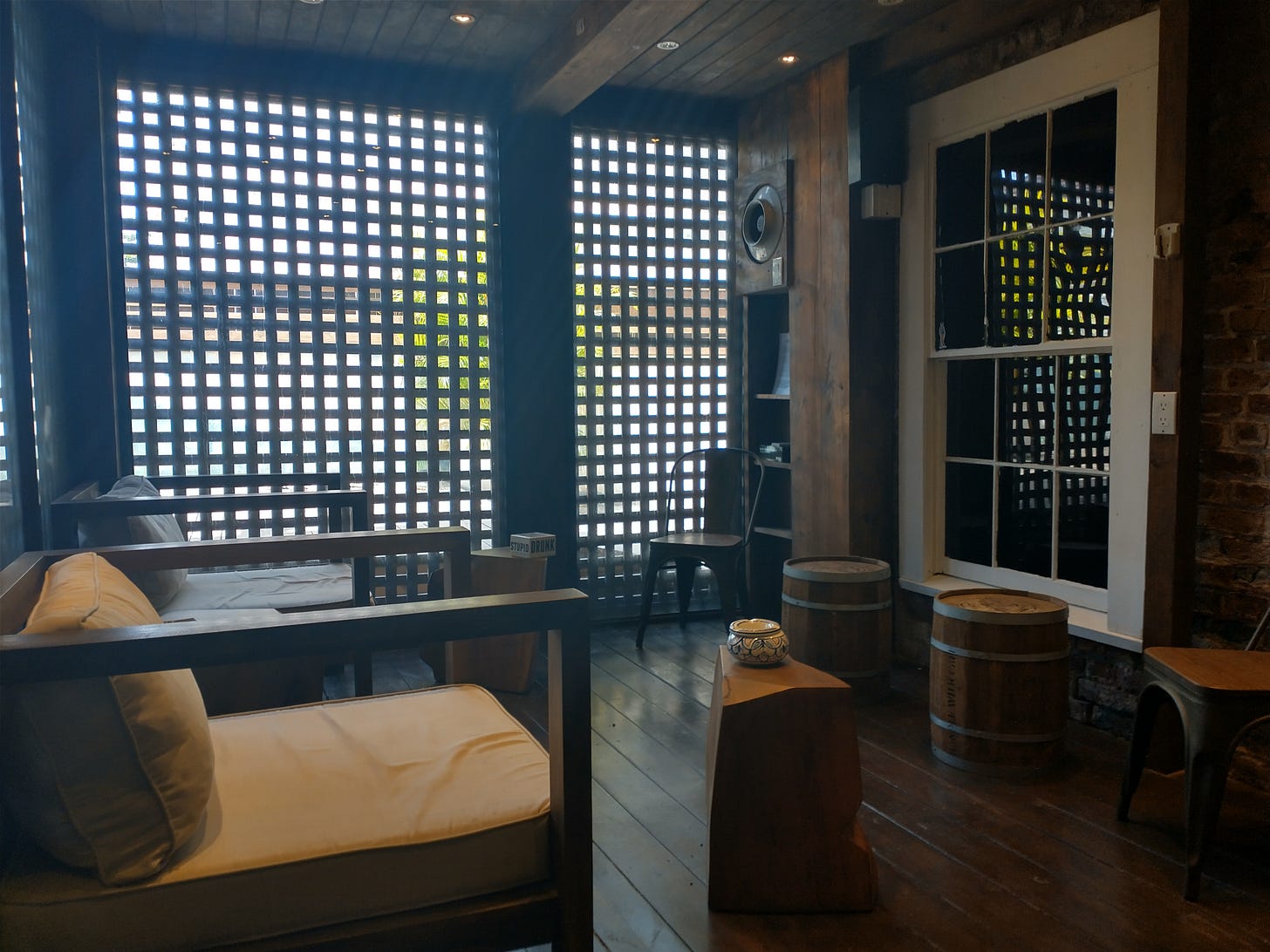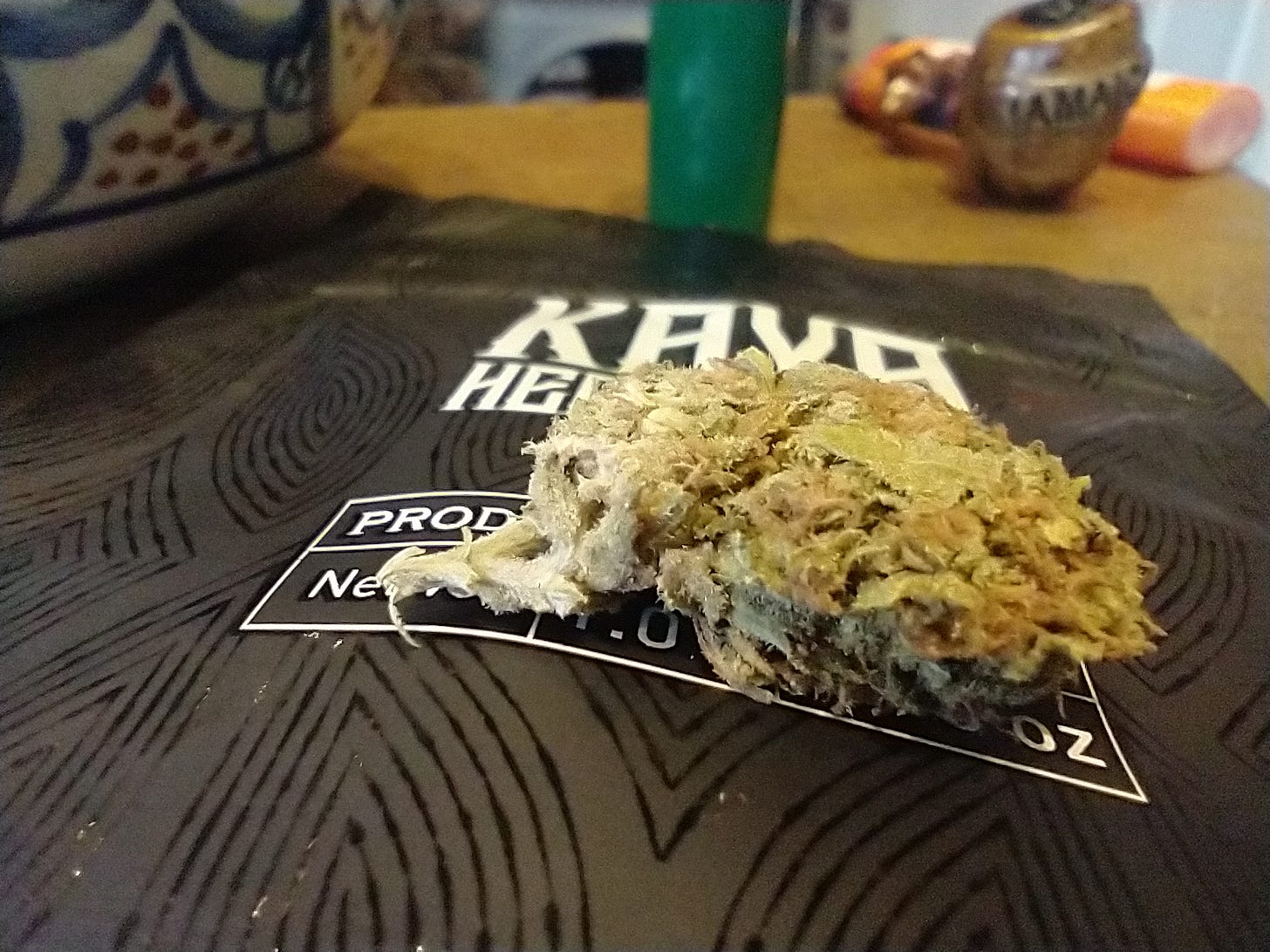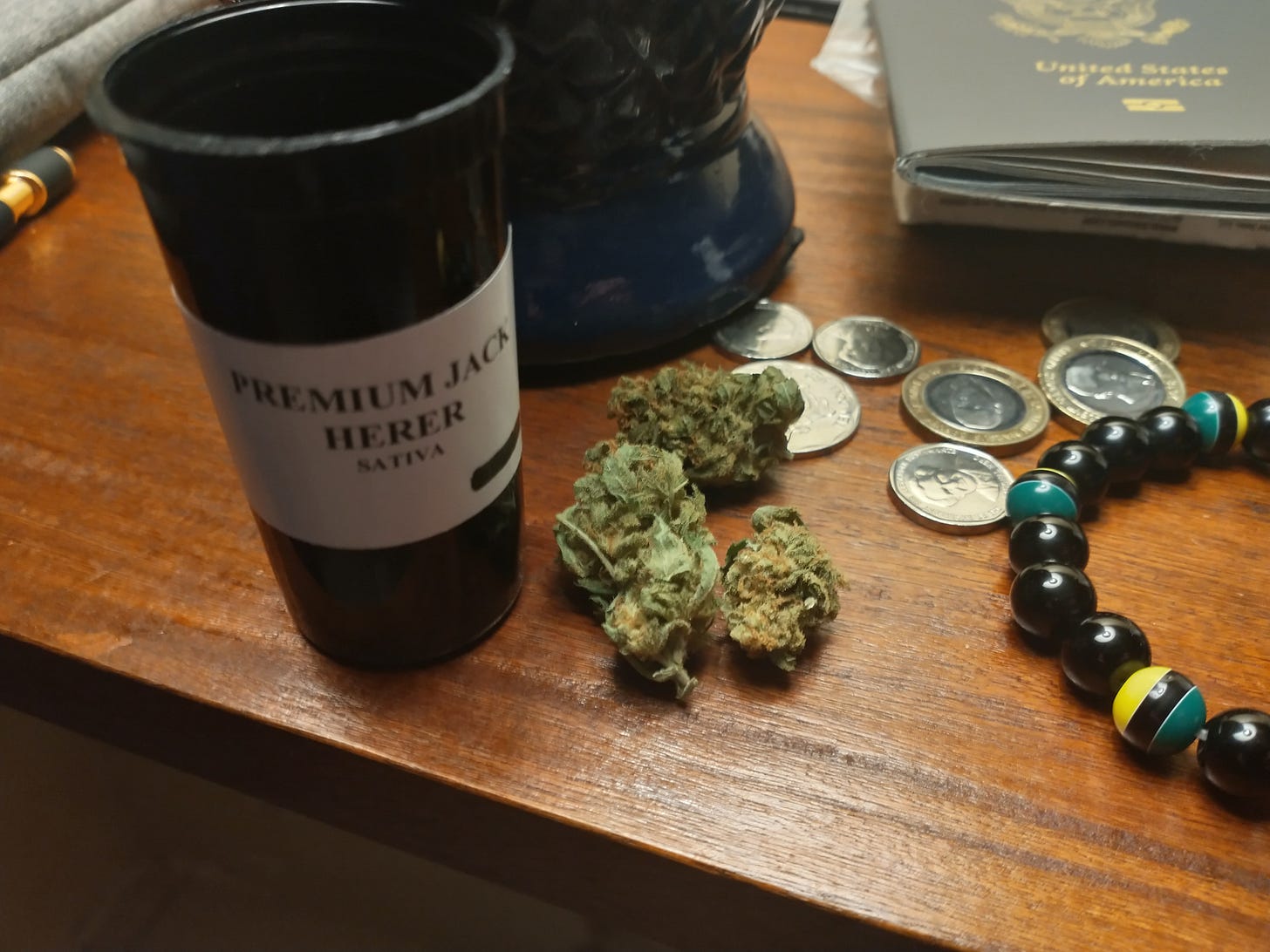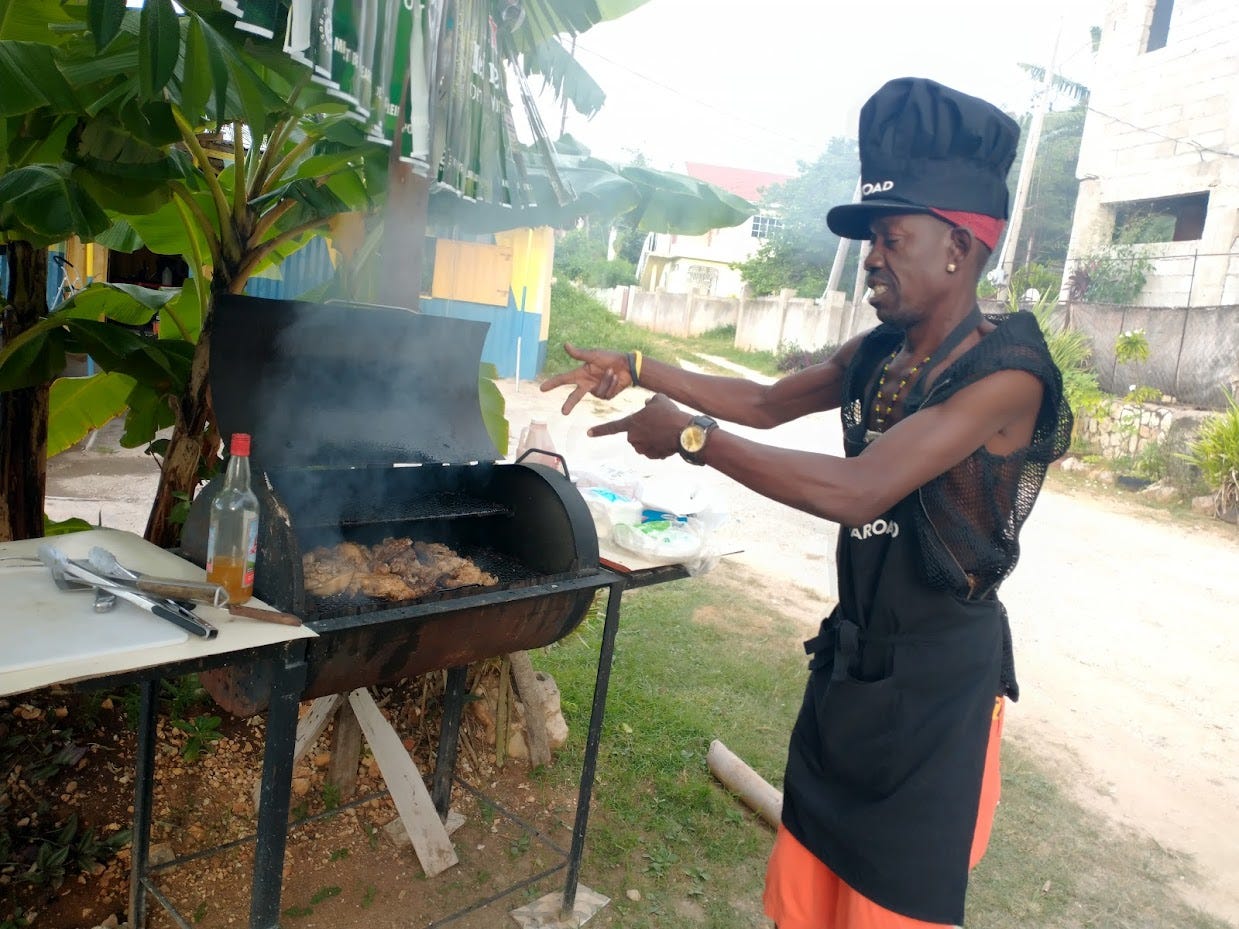Burn After Reading XIV
Jamaica, Podcasting, duopolies, and more!
Welcome to the 14th edition of Burn After Reading! This is my newsletter on cannabis (and other things). You can check out last week’s issue here, and if you haven’t subscribed yet, please do!
I was 1,700 miles away from Worcester last week, but that didn’t stop me from connecting with a fellow masshole to fulfill my Cannabis Confidential duties. While at CanEx in Jamaica, I spoke with Matt Kurtzman, founder and CEO of Canold — a cannabis data analytics firm. We talked about the value of data to cannabis businesses and consumers, and how his experiences with the plant have shaped his career.
A while back, I had the privilege of sitting down with the guys from For The Record podcast to discuss life as a cannabis columnist, R&B, and *checks note* …O.J Simpson?
You can check it out here:
And if you liked that, I’ve got good news: I’m going to be joining the FTR crew on a weekly basis from here on out as a regular member of the show! More details to come to soon, but I’m really looking forward to this.
My thoughts on the ganja scene in Jamaica and CanEx:
The night I arrived in Jamaica, I headed across the street to the local jerk chicken hut. The grill wasn’t on that night, but within 30 seconds of meeting the proprietor, he asked me if I smoked.
“Ganja?” I asked. His face lit up with a smile, and reaching behind the beers sitting on his stand, he pulled out a big jar of weed.
Cannabis is indeed everywhere in Jamaica. The jerk chicken guy will offer you some. Your cab driver will offer you some. Sometimes a ganja farmer will be wondering around the street you’re staying on, selling his wares door-to-door.
No matter who I bought from on the streets of Jamaica, it seemed to be the exact same bud. It wasn’t the worse quality I’ve ever seen, but you had to prepared to deal with sticks and seeds aplenty. It got the job done, but after a few days, I was seeking something a bit better.
Staying in a small apartment about halfway between Montego Bay and Falmouth on the northwest coast of Jamaica, I decided to head east towards the latter city, as the conference would have me heading towards MoBay plenty of times in the following days.
Arriving in Falmouth on a day where there were no cruise ships docked at the port, I quickly realized it was not a tourist town. In fact, I didn’t see a fellow obvious foreigner the entire time I roamed about the city. Almost every picture you see of the city on google images depicts the cruise ship port, a collection of shops and restaurants featuring companies like Pandora Jewelry and Jimmy Buffett’s Margaritaville. This area remains off-limits for local residents and anyone without a cruise ship bracelet, and that area of town is a complete ghost town when a ship is not in port.
The real city is a more gritty and real place, and it’s here you’ll find the Kaya Herbhouse — the first Jamaican dispensary I visited on my journey. The familiar green cross lets you know that you’re in the right place, and once I let the security guard know I had a Massachusetts medical card, I was quickly let into the sales floor.
Despite the country’s reputation, cannabis can’t be legally bought and sold as a recreational substance in Jamaica. Legal operations are purely medical, but if you don’t have a card from the states, don’t fret. Herbhouses will be happy to connect you with Doctor Feelgood via the telephone, and he will quickly diagnose you with migraine headaches — even if you never mentioned your head hurting.

There were a lot of familiar strains on the menu, with prices listed in US dollars to make things easier for the tourist crowd. The package didn’t specify how it was grown, but judging from Kaya’s social media, it seems like most of their product is grown in greenhouses. So if you’re looking for authentic Jamaican strains like Lamb’s Bread, you might be disappointed.
It seem like most tourists want the stuff that they recognize from back home, and the herbhouses cater to those demands in response.

That being said, Kaya’s products were still very enjoyable. The gram of Island Girl I bought was crystal-y and aromatic, if a bit dry.
Despite being a solo traveler in a completely empty room, the lounge was a relaxing relief from the hot streets of Falmouth. It can’t be understated how nice it is to be able to actually consume cannabis in the same place where you bought it. Most herbhouses in Jamaica contain places to consume, some even offer alcohol and food — serving as night clubs that are open to 2am. It’s unimaginable that U.S. regulators would ever allow such a thing here, but the sky has not fallen as a result of this activity in Jamaica.
A few days later, I checked out Epican in Montego Bay. I picked up two pre-rolls (Orange Kush and Super Silver Haze) and an eighth of Jack Herer (total price: J$4400, about US$29).
The trim wasn’t perfect, but it was still some pretty high quality flower.
I’ve been told if you’re looking for extremely high-quality, organic local flower, you have to head to the hills surrounding Negrill, about an hour and a half south of MoBay. Maybe next time I’ll make it down there….
CanEx
CanEx brought together an amazing group of individuals. In addition to it drawing cannabis stakeholders and regulators from across the hemisphere, there were also some familiar U.S. faces. Wanda James — the first black woman to own a marijuana dispensary in the U.S. — was in attendance, as was Marijuana Policy Project CEO Toi Hutchinson and Beau Whitney of Whitney Economics.
It was a tremendously valuable experience to have the chance to cover this event. The quality of the people there was unlike any cannabis related event I’ve been to in the last decade, and the international-focused discussions are much needed. I highly recommend checking it out next year if you’re in the cannabis space.
I’ll be putting out some pieces in the following days and weeks that deal with my experiences at CanEx, including a deep dive into the cannabis banking situation in the Caribbean that will be dropping here soon.
I want to do a longer travel guide piece on Jamaica at some point, but here’s some quick tips for anyone looking to visit the Montego Bay area.
I stayed in a studio apartment at Calypso Villa Guest House, which is located on the main A1 Highway between Montego Bay and Falmouth — a city most famous for its crocodile farm (featured in Roger Moore’s Dr. No) and its bioluminescent lagoon.
Despite the modest price, it’s in a beautiful location directly on the Caribbean Sea, and the perfect spot if you rent a car or if you’re willing to risk in the route taxis — an extremely cheap (and moderately dangerous) way to get around.
If you stay at Calypso Villa, make sure you head across the street to the car wash/jerk chicken hut, run by Chef Out-a-Road.
I also had an amazing steamed fish dinner at Peppa's Cool Spot in Montego Bay, which has a gorgeous view of the bay.
If you’re interested in attending next year’s CanEx (assuming it’s held at the same location), be sure to keep an eye on their website.
Vireo Health — a company that was last in the news for somehow getting away with no punishment after being caught smuggling cannabis products across state lines — is back in the headlines again.
At least the shady move they’re attempting to pull this time is within the confines of the legal system, as they have announced they are suing Minnesota over it’s new hemp-derived edibles law.
Apparently, the company is pretty determined to maintain their duopoly over cannabis in Minnesota. From MJBizDaily:
Marijuana multistate company Vireo Health, one of two licensed medical cannabis operators in Minnesota, filed a lawsuit against the state alleging that a new law allowing hemp-derived edibles sales unfairly discriminate against MJ-derived edibles makers…
…Minneapolis-headquartered Vireo Health, which does business as Green Goodness Holdings, and Chicago-based Green Thumb Industries, are the two licensed MMJ operators in Minnesota.
Last spring, state officials passed a law allowing unlicensed companies to sell hemp-derived edibles containing THC to be sold in grocery and convenience stores. But under the law, which took effect July 1, Vireo and Green Thumb – which produce marijuana-derived edibles, are restricted to selling products to patients registered in the state’s MMJ program.The law, which took effect July 1, has attracted a number of out-of-state brands and retailers to Minnesota.
The company argues that “there is no rational basis to create separate legal requirements for sellers of medical cannabis-derived edibles, like Vireo, and sellers of hemp-derived edibles.”
This simply isn’t true.
For the hemp-derived market in Minnesota, dosage is limited to 5 mg, and consumers don’t have the same assurances over quality that they would if they bought a product produced under Minnesota’s medical law.
This is fine for recreational consumers, but these products would not be suitable for a medical patients, who may need a stronger dose or more cannabinoids than just THC, and would likely prefer a more targeted product that has passed more stringent testing requirements.
Plenty of states have different rules for medical cannabis and adult-use cannabis, and it’s laughable that Vireo is somehow having their rights violated when there’s literally nothing stopping them from participating in that market.
Theoretically, a company like Vireo that has experience in manufacturing cannabis-based goods AND experience with running retail stores could easily enter the hemp-derived edibles market in Minnesota, whether that be through partnerships with local companies or their own vertically-integrated approach. But instead of trying to build their brand and actually compete with other companies on the open market, Vireo is flailing all over the place, filing a lawsuit that doesn’t hold to basic scrutiny in a desperate attempt to preserve their duopoly.
I wish them the best of luck in their attempt to enter the Massachusetts market, a space where their products will have to actually compete with others on merit.
Writer/activist Grant Smith-Ellis put out this great post on the state of cannabis regulations in Massachusetts. As the CCC gears up for a regulatory review, it’s important to keep in mind what victories have already been won, and where there’s still work to be done. Give it a read.
Some quick hits:
Cannabis Legalization Must Address Monopoly Dangers (Shaleen Title and Matt Stoller/Parabola Center)
The most profitable cannabis businesses in Canada are owned by government (Matt Lamers/MJBizDaily)
Assault charge could tarnish image of Ascend, entire cannabis industry, consultants warn (Kate Robertson/MJBizDaily)
Dispensaries, regulators discuss cannabis regulation in wake of [RI] recreational legalization (Elysee Barakett/Brown Daily Herald)
Leafly Report: ‘Opt-out’ towns are encouraging illegal marijuana sales (Bruce Barcott and Beau Whitney/Leafly)
New rules coming with [MA] at cannabis crossroads (Colin Young/State House News Service)
Getting Answers: where does the [MA]'s marijuana tax revenue go? (Mary Wilson and Samantha O'Connor/Western Mass News)
Upcoming New England/Virtual Cannabis Events
9/24: Boston Cannabis Week: Xperience Boston.
2PM-10PM. 90 Traveler St, Boston, MA
9/24: Fyre Cup.
11AM-10PM. Easthampton, MA.
9/27: Cannabis Industry Networking Conference @ The Connecticut Convention Center.
6PM-10PM. 100 Columbus Blvd Hartford, CT.
WELCOME DISTRACTION OF THE WEEK: If you’re a fan of It’s Always Sunny in Philadelphia, you’re missing out if you haven’t already checked out the Always Sunny podcast. You can check it out here.
CAT OF THE WEEK: Corn is having a moment, and finally, there’s a cat out there capitalizing on it. This Reddit post promises a cat that loves corn, and boy does it deliver. Check out the video here.




